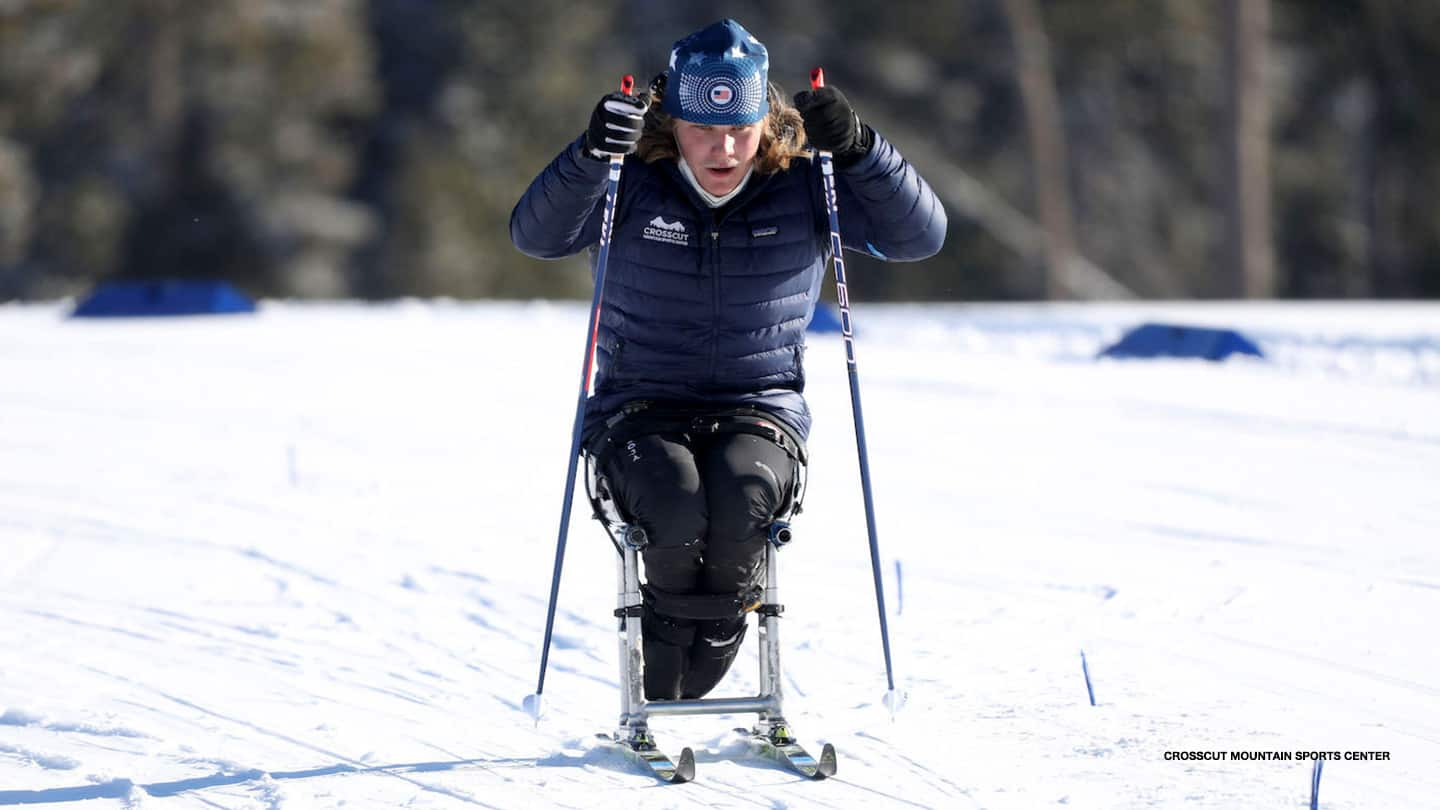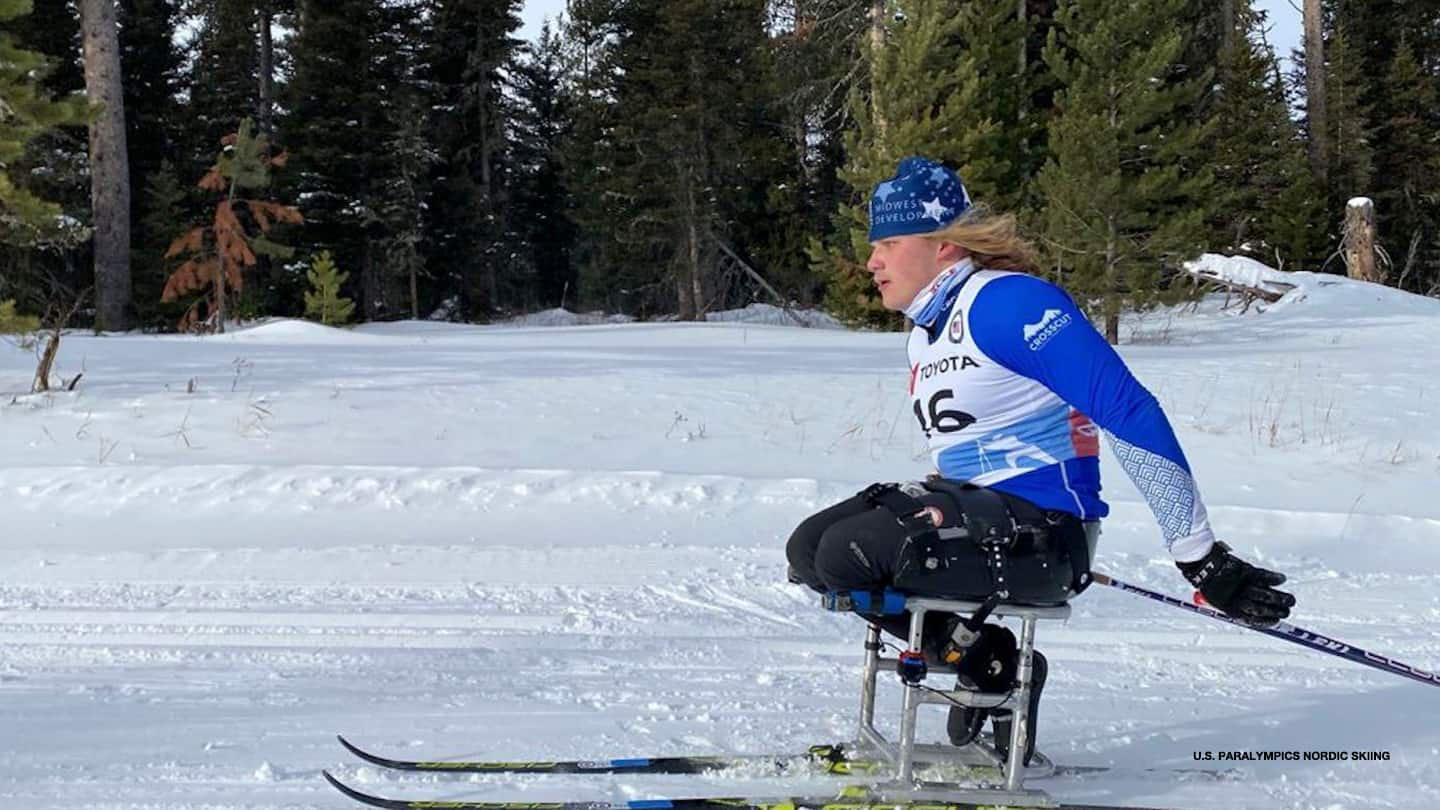
Meet Ty Wiberg — An Up-And-Comer On Team USA’s Para Nordic Ski Development Team
by Lisa Costantini

Ty Wiberg in action for the U.S. Paralympics Nordic Skiing Team at Crosscut Mountain Sports Center in Bozeman, Mont.
At 21 years old, Para Nordic skier Ty Wiberg has already faced 27 surgeries. So, it’s safe to say that surgeries and medical procedures are a normal part of his life.
Having been born with spina bifida, the biathlete and cross-country skier is no stranger to hospitals, but his latest surgery took him by surprise.
“This surgery wasn’t anything new, but I haven’t had one in 4-5 years,” Wiberg said. “Things were going well, and then all of a sudden, something went wrong that you didn’t expect — it was frustrating. There were a lot of emotions.”
The surgery fell on Halloween and was done as a way to remove a shunt that was present in his brain since birth.
Via social media, he shared: “With huge advancements in technology and surgery in the last 20 years they were now able to put a hole in the base of my ventricle for fluid to drain. Allowing me to have more longevity and less problems…”
His reason for sharing openly was to let others know that it’s okay to not be okay sometimes — a message he shares a lot. “You don’t always have to put a smile on your face,” he said. “It’s okay to have a bad day, but you’re in control of what happens when you’re down in the dumps.”
That motto is one he has to constantly remind himself of.
“While I’m all healed, and my fitness is slowly coming back, it’s the mental side that’s hard,” Wiberg revealed, returning to the snow four weeks after surgery. “I’m not hitting the goals I set for myself prior to all this happening, but I’m grateful for the ability to be skiing as soon after surgery as I am.”
Something that helps him stay in the right mindset is journaling.
“Looking back in my journal and seeing where I was and if I’m upset about a practice, telling myself, ‘hey, you just had surgery.’ This is part of the process,” he remarked.
His coach, Nick Michaud — the coach for the Crosscut Elite Team and the U.S. Para Nordic development coach — also keeps him in check.
“He’ll tell me if I say practice sucked, ‘You’re doing so much better than any of us expected this soon after, so I have to give myself more credit.’”
The junior at Montana State University competed in his first race following surgery at the U.S. Paralympics Nordic Skiing Sit Ski Nationals in Midway, Utah. Only a month after getting back on the hill, Wiberg cleaned in biathlon, hitting all 10 of his targets.
“I didn’t do as well as I hoped in the 5K, but that was kind of expected,” he said. “Overall, just getting to be there and compete was a victory in and of itself.”

Ty Wiberg in action for the U.S. Paralympics Nordic Skiing Team at Crosscut Mountain Sports Center in Bozeman, Mont.
Ultimately, the end goal is to qualify for a FIS Para Nordic Skiing World Championships and a Winter Paralympics as a Nordic sit skier. He fell shy of qualifying for the Paralympic Winter Games Beijing 2022 last March. “I raced my hardest, but it didn’t go as planned,” Wiberg shared. “The way the points worked out, it wasn’t in the cards for me.”
Wiberg first started competing just six years ago.
“I’m in the sport to compete and do well,” he said. “The goal is worlds and the Paralympics, and ultimately medal.”
For now, he said, he’s taking it day by day.
“In addition to those big goals, I also have in-between goals that are always changing,” he revealed. “Now it’s getting healthy. Before it was get moving and see if you can compete.
“Smaller goals include qualifying for another world cup. I know it sounds super basic and broad, but with the seasons that I’ve had with these ups and downs, going to a world cup is big. I also want to continue to do well. Staying consistent in competition is another goal of mine.”
In an effort to do that, the Chippewa Falls, Wisconsin, native is either on the snow or in the gym six days a week, training with the development team. Like many Para Nordic athletes who compete in cross-country and biathlon, Wiberg splits his time between the two sports.
“What that means for my schedule is that Tuesday and Thursday, I’m at the range shooting and doing interval training, and Wednesday and Fridays are cross-country ski days where we’re typically doing intervals. Saturday and Sundays, we typically ski longer distances, and we lift two days a week,” he shared.
He’s thankful for his team of coaches who provide him with a training plan and any additional resources he’d need. It’s part of the reason he’s been able to achieve as much as he has in the two months since his surgery, where he struggled to even get out of bed.
“Going from working out almost every day and sometimes twice a day to suddenly being in the hospital with a walker and getting tired — that was a big shock,” he said.
But his spina bifida diagnosis is a part of his story.
“I’m thankful for having a disability, and I wouldn’t want to change it,” he admitted, “Because ultimately, it gives me a voice to express that things might not be great all the time, but it gets better.”